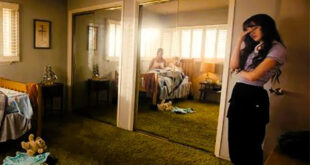
The process we go through before we make pivotal decisions in our lives oftentimes results in a struggle that others do not understand. In Unstuck by Lucy Thurber, Built by Robert O’Hara, and Love Letters to a Dictator by Stella Fawn Ragsdale, the protagonists are “dancing on the head of a pin” and cannot decide in which direction to turn before plunging into the unknown to start a different aspect of their lives.
In two of these one act plays, part of the Summer Shorts Series B at 59E59 Theaters, the protagonist’s struggle is opaque while on the surface he appears confused, annoyed and acutely distracted. Their inner conflicts are unknown to us and the surrounding characters until the end of the play. In the third, a solo performance, the protagonist writes letters voicing her concerns to the recipient. She selects a highly unusual individual as a sounding board to help her make a decision about the next bend in the road of her life journey.
In Lucy Thurber’s Unstuck, directed by Laura Savia, it is Pete’s (Alfredo Narciso is droll and deadpan humorous as Pete), birthday and it is apparent that he is going to suffer through the day sustaining women in his life who know him and harangue him during their visits to celebrate his birthday. The first is his sister Jackie (the funny, gangly and appropriately awkward Lauren Blumenfeld), who asks him to guide her with her tap dancing. After these siblings wrangle about the inanity of her request, Jackie reveals why she has come to tap dance for Pete. Her discussion indicates that Pete is troubled and depressed and he is unable to “get out of his own way.” He has been at a point of stasis for months and incapable of moving in any viable life direction. Her concern for him is echoed by Sara (Carmen Zilles) who visits Pete after Jackie leaves, almost as if on cue. She, too, has noted that Pete is in a state of crisis and as he listens to her “rant” with an austere, laconic diffidence, we are led to think that Pete’s despondence may even lead to an even greater self-diminishing act, despite the humor of the situation and the women’s useless attempts to “budge” Pete off his rock.

However, the stakes have been raised. During these visits the playwright taunts us with Pete’s strange and sad condition viewed through the perspectives of his sister and friend. What is wrong with Pete, we wonder as Sara leaves after giving him her birthday present. When his partner and significant other, Deirdre (KK Moggie), arrives, we expect that they will get ready for Pete’s birthday dinner as Pete told Sara he had to do to cut short Sara’s visit. But Pete doesn’t get dressed. Nor does he get ready to go out. He sits and unflinchingly picks an argument with Deirdre who is not readily understanding him. We intimate that Sara and Jackie are right; he is a mess, and we are convinced that Deirdre’s and Pete’s relationship is heading toward splitsville. Most probably Pete wants to be alone to follow his impulses of sadness and depression and dig a hole that he will use to bury himself in.

The ironic humor of Unstuck is how the playwright initiates clever plot and character twists. Pete has been tormented about making a decision which apparently has plagued him for months. Finally, on his birthday, he sees there is no way out. He confronts the truth of himself and his life, and Deirdre helps him move forward. What this entails is unexpected and humorous, and the antithesis of the dire outcome we have presumed might occur. Thurber has taken us to the brink and confounded us by the outward ethos of angst-ridden, immovable Pete. And then, when we least expect it, she gives us a relief-filled “Ah Ha” moment which is charming. By the play’s conclusion, we are reminded that male and female perspectives are at polar opposites. Only with love can such disparate viewpoints merge.
On one level Built may refer to the physique of the lithe and buff Mason (a smirking, smoldering Justin Bernegger), who upon initial introduction in what follows as a series of unexpected turns of plot and action, takes money from Mrs. Back (a nuanced, intense, and relentless Merritt Janson). We anticipate that this older woman has hired this young man for sex. However, as the first intrigue is stepped up and intensifies, we discover this is wrong. Nothing and no one is who or what they seem. Mrs. Back and Mason have a long standing relationship. Not only does this couple enjoy tormenting, teasing, and preying upon one another, the undercurrents in their personalities reveal that their bonding in the past has heralded a psychological and perhaps physical sadomasochism. Both have enjoyed and been repulsed by what only they could have elicited from each other’s twisted, unwholesome beings.
On another level Built refers to the intricate structure of what Mason and Mrs. Back have created between them. Are they in love? Are they playacting? Are they gaming one another? Are they titillating one another as foreplay? Have they gotten together to relive moments that actually nurtured each other’s souls or destroyed them? Perhaps. On the other hand, the playwright shocks us with the revelation that Mrs. Back was Mason’s teacher when he was in high school. She was both lured and set up by Mason, who holds a power dominance over her. And yet, she holds a power dominance over him. The two are obviously deeply attracted to each other, even now, ten years later, and yet they are filled with anger and hatred and vengeance toward one another. One of them must win in this struggle toward the ineffable, and away from the unholy. One of them must now be the victim. In that both will be victimized by the action of revenge.

Where these two will tango next is what playwright O’Hara who is also the director, enthralls us with in a moment to moment sniffing and circling of animal intelligence ready to pounce. When the final truth is exposed, because the actors have pulled out all the stops and the writing is so rich, we cannot believe our ears and eyes. Can this be true? If it is, then most probably these two will meet again, though on the surface, it appears that this is an impossibility. Yet, patterns of behavior between individuals die hard and it doesn’t appear that either Mason or Mrs. Back have done the work to initiate wholeness or health in their psyches or souls. The torment and sickness will most likely continue. The dance may abate for a season, but there is a bond that appears lasting in its twisted torment. It is the multi-layered depth of this tie of enslavement that cannot be easily broken, despite Mason’s final plunge to end “it all.”
O’Hara and the actors have created a riveting production, though one might assess that the ending is contrived to surprise. But the complexity of characterization and the fine performances keep the play afloat and away from the quagmire of judging it as artificial or assessing it for its plot and conflict only. The relationship between these two characters is profound and layered, and from that themes emerge about the nature of relationships and the substance contained in the glue that melds couples. At times, the cohering elements are sinister and malevolent. Sometimes the nefarious is what attracts, excites, and mesmerizes a couple toward paths of self-destruction that are psychic and sexual. As the playwright reveals in Built, out of the self-destructive actions, patterns of need are created that forever imprison. Despite the extreme lengths individuals may go to to sever the damaging circularity of self-harm, wholeness cannot be achieved especially when there is only vengeance, and forgiveness isn’t an option.

There is forgiveness in Love Letters to a Dictator, by Stella Fawn Ragsdale, directed by Logan Vaughn. Stella (played by Colby Minifie in a solo performance), is working on a farm in the Hudson Valley far from her mother and family in Tennessee. Though she has attempted to “make it” as a writer in New York City, she has been forced to find work upstate. She is alone and lonely and to work through issues about her inner self and her chosen life path, she has elected to write letters to a stranger. She has selected someone whom she thinks most probably will not write back. Surprisingly, the individual does reply and she uses him as a sounding board to question herself as she strikes up a quasi pen-pal relationship with him. During the letter writing process to this most unlikely of individuals, Stella works through her emotional turmoil. Based upon his responses to her, she eventually arrives at a decision which changes her life’s direction.
What is fascinating and hyper sardonic about Ragsdale’s play is who Stella writes to. It is in fact someone who would be the last person on earth one might want to communicate with because of his reprehensible nature and actions (in life this dictator was particularly loathsome and murderous). How Ragsdale initiates and continues Stella’s communication with this rotten human being is in part humorous and surprising, and the exchange that occurs between them appears to be substantial and believable even in this age of instantaneous digital media. The playwright also intimates that as Stella has been positively influenced by the malevolent dictator, perhaps she has positively influenced him, also. However, the inference is subtle which makes the arc of the plot intriguing.
I found Colby Minifie’s performance as Stella less convincing and innocent than perhaps I would have liked. Stella’s naivete as a character requires ingenuousness, especially with regard to Stella’s simplicity and unwariness in the beginning of her letter writing campaign. Believable innocence is imperative to show Stella’s growth when she sees the dictator’s despicable behavior on TV and calls him on it in one of her last letters to him before he dies. In a subsequent letter when she doesn’t hear from him, she apologizes and expresses her worry about his health. This contrition would be more poignant, if Minifie’s absence of guile proceeded from a simple heart. I didn’t find that to be the case: the theme that innocence often has an indelible influence against evil and the notion that Stella’s “child-like” letters greatly impacted the dictator would have been more pronounced and would have resonated in a more thrilling way.
Summer Shorts Series B offers productions that are not only entertaining but are enlightening and engrossing. Unstuck, Built, and Love Letters to a Dictator will be running until August 29th.
[amazon template=iframe image&asin= 0760345627] Blogcritics The critical lens on today's culture & entertainment
Blogcritics The critical lens on today's culture & entertainment


